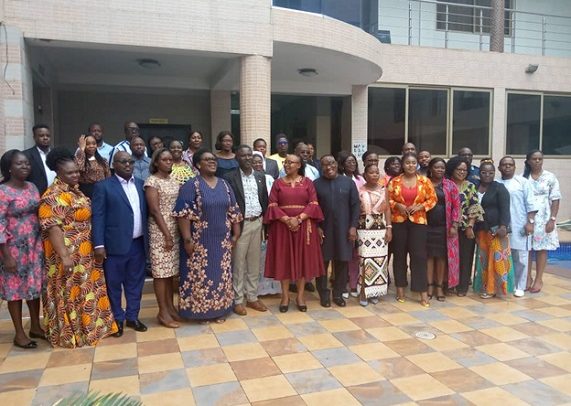Some of the participants in a pose after the programme
The Executive Secretary of the National Peace Council, George Amoh, has called on stakeholders involved in peace building interventions to partner women as active partners in resolving conflict, especially in conflict prone communities, due to the influence they wield in the decision making processes at home.
Speaking at a lecture organised by the West Africa Centre for Peace Building (WANEP), in Accra, he said, “If you look at our country now, when it comes to conflict intervention, women have a unique way in influencing the way we think and for that matter, if you are undertaking any peace building activity without bringing on board women, you are missing on a whole lot of issues.”
“Speak out, talk to your children, talk to your husband that this conflict cannot continue forever if you lose today, you can win tomorrow, so let us give peace a chance and we expect women to participate in this effort. Women are critical in resolving conflict,” he added.
For her part, Deputy Executive Secretary of WANEP, Mrs. Levinia Addae-Mensah, said the meeting would afford them opportunity to address the gaps in responding to specific needs of women, to help them change the existing traditional practices to build sustainability.
She stated “the meeting will provide an opportunity for young people to share the solution they are adoptive to climate change action and how there can be a partnership between men and women. The meeting at the end will come out with action plans and begin to integrate them in existing processes on the ground.”
“We want people to leave with the believe that there is the need for urgency and more importantly pay particular attention to women and influence how climate change issues would be addressed in connection with peace in Ghanaian communities,” she noted.
Commandant at the Kofi Annan International Peacekeeping Training Centre (KPITC), Major General Francis Ofori, also said the impacts of climate change were increasingly recognised as a potential factor of conflict in combination with other socio-economic and political factors.
He, therefore, suggested that designing policies and programmes that meaningfully engage women in addressing the gender differentiated risks and opportunities of climate change impacts in fragile context could contribute to better addressing the root causes of conflict to promote more inclusive peaceful societies.
Present at the meeting were stakeholders and policy makers from West African countries experienced in transformation and the use of adoptive technologies on gender and climate issues.
By Ebenezer K. Amponsah

